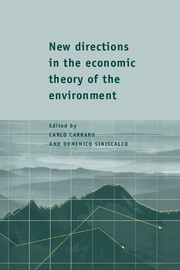Book contents
- Frontmatter
- Contents
- List of contributors
- 1 Theoretical frontiers of environmental economics
- 2 Growth with natural and environmental resources
- 3 Environmental policy and technological innovation
- 4 Environmental policy, distortionary labour taxation and employment: pollution taxes and the double dividend
- 5 International coordination of environmental taxes
- 6 Environmental policy and international trade
- 7 Environmental regulation and international capital allocation
- 8 Towards a theory of international environmental cooperation
- 9 Group formation in games without spillovers
- 10 Non-cooperative models of coalition formation in games with spillovers
- Index
8 - Towards a theory of international environmental cooperation
Published online by Cambridge University Press: 11 January 2010
- Frontmatter
- Contents
- List of contributors
- 1 Theoretical frontiers of environmental economics
- 2 Growth with natural and environmental resources
- 3 Environmental policy and technological innovation
- 4 Environmental policy, distortionary labour taxation and employment: pollution taxes and the double dividend
- 5 International coordination of environmental taxes
- 6 Environmental policy and international trade
- 7 Environmental regulation and international capital allocation
- 8 Towards a theory of international environmental cooperation
- 9 Group formation in games without spillovers
- 10 Non-cooperative models of coalition formation in games with spillovers
- Index
Summary
Introduction
Twenty-five years ago, in an introductory article to research in environmental economics, Kneese (1971) distinguished between two types of environmental problem: ‘global’ problems which affect the entire planet and ‘regional’ problems which include ‘all those other than global’. In justifying this last classification, Kneese reasoned:
One must use a word like regional rather than terms pertaining to political jurisdictions such as nations, states, or cities because the scale of pollution resulting from the emissions of materials and energy follows the patterns, pulses, and rhythms of meterological and hydrological systems rather than the boundaries of political systems – and therein lies one of the main problems.
The conclusion to this sentence hints at a possibly important research agenda: international management of environmental resources. Yet, it is only fairly recently that this topic has been the subject of serious examination by economists. The purpose of this chapter is to explain why the transboundary aspect of environmental protection should be ‘one of the main problems’ of environmental management, and to develop elements of a theory which explain the extent to which institutions may be capable of correcting such problems.
The dilemma of international pollution control
The essence of international environmental relations is that countries interact. When any one country chooses its transboundary pollution policy, it will consider what policies other countries will choose, or how others will respond to its own choice. It is in this sense that international pollution control is a ‘game’.
- Type
- Chapter
- Information
- New Directions in the Economic Theory of the Environment , pp. 239 - 280Publisher: Cambridge University PressPrint publication year: 1997
- 32
- Cited by



